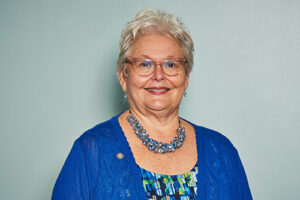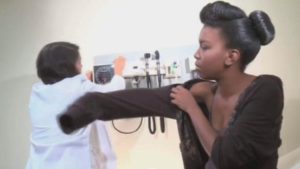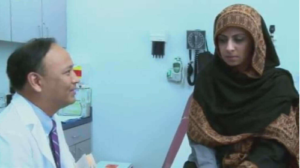Menu

SUMMER 2023

How many times have we heard the roller coaster analogy of the ups and downs of life, the ups and downs of a relationship, and the ups and downs of starting a new job? After my first year as CEO of our association, I can honestly say I’ve learned a thing or two about roller coasters.
Let me share a little secret with you: When I was first approached about throwing my name in the hat for the CEO’s job, I declined. It certainly wasn’t because I didn’t relish the opportunities the role would provide to help North Carolina’s free and charitable clinics thrive.
It was because I was so happy working at Lake Norman Community Health Clinic, where I had 23 years of history and friendships and the honor to lead some of the most exceptional people I’ve ever known. My plan all along was to work there until the day I retired.
Respected colleagues inside our association kept nudging me to reconsider. I was reminded that executive directors innately do not know the meaning of the word “no” – that’s to say they are innately adept at turning a “no” into a “yes” – and my peers certainly didn’t listen to me.
Upon reflection, I am in debt to everyone who challenged me and encouraged me to pursue this role. I am privileged to work with an incredibly talented and passionate team that is dedicated to serving our members and bringing innovative ideas for growing and supporting our clinics.
I am very proud of what we have accomplished this year. Your NCAFCC staff has worked diligently to serve our members through advocacy, program support, funding and training. We have taken on new roles and responsibilities to help our members leverage resources and obtain additional funding that increases the ROI for our funders. Here are the highlights:
More exciting changes are on the horizon! NCAFCC headquarters will have a new home in Charlotte beginning in August. Our new facility features a 60-seat classroom and two smaller boardrooms that will be available for members’ use for meetings and training sessions.
Over the course of the past year, I’ve had the chance to visit 19 member clinics to celebrate a multitude of exciting events – each one a reminder we are growing and evolving together with the sole purpose of ensuring access to quality health care for all regardless of ability to pay.
Change is hardly ever easy, but it can be hugely rewarding. Thank you for your continued support, and please know we are honored to be serving each and every one of you!
Thank you!
April Cook
Chief Executive Officer
 When Sandy Motley retires sometime in 2024 after 33 years heading Davidson Medical Ministries (DMM), she’ll leave behind a legacy that may never be matched as the longest-tenured leader of a free and charitable clinic in North Carolina.
When Sandy Motley retires sometime in 2024 after 33 years heading Davidson Medical Ministries (DMM), she’ll leave behind a legacy that may never be matched as the longest-tenured leader of a free and charitable clinic in North Carolina.
But more important, Sandy has shown by her own example the faith, perseverance, creativity and adaptability required to serve a community’s changing health care needs as she led her clinic through three decades of growth and challenges, including recessions, a pandemic, and a Christmas Eve flood.
Providing health care to Davidson County’s uninsured wasn’t the career path Sandy envisioned as a teenager. At the age of 16, she felt God calling her into some kind of full-time ministry, and when she later married a pastor – her husband of 43 years, Mike Motley – she thought she had answered the call.
It was only after the young couple moved to Davidson County in 1989 that Sandy realized God had other plans for her. Local physician James F. Slyman had seen the community’s unmet health-care needs firsthand in the emergency room of the hospital and through his volunteer work at a homeless shelter. A grassroots group was starting a clinic, and he was looking for a nurse administrator to run it.
“I got a call from Dr. Slyman saying that I had been recommended for the position by a woman in our church,” Sandy recalls. “I didn’t even apply for the job.”
It was a part-time job to start, which as the mother of two young boys suited Sandy just fine. She soon knew she had found her true calling.
“When I walked into what was our first clinic under construction, I felt like God was saying this is why I put you on earth,” she says.
Like all free and charitable clinics, DMM had modest beginnings, opening in February 1992 in a small building that it rapidly outgrew. The clinic held hours one night a week to start, then two nights, then two nights and one morning. Sandy remained the only paid staff member until the late 1990s when the clinic added a part-time administrator and part-time pharmacy tech.
DMM hired its first paid provider in 2000. The clinic had also completed a capital campaign to fund a new building, which was two and a half times the size of the original clinic and opened in April of the same year. At the same time the clinic changed from a free clinic to a free and charitable clinic.
By 2005, DMM had opened its second location in Thomasville in the outpatient department of Thomasville Medical Center. Patients would come to the hospital cafeteria on Wednesdays to pick up medications DMM had couriered from Lexington. “You want fries with that?” Sandy jokes.
More change came a few years later when the Great Recession hammered the local economy. As the only safety net provider in a physician-underserved county, DMM was overwhelmed with new patients – laid-off workers who had lost their insurance and Medicaid recipients who couldn’t find a doctor.
“We were seeing patients that we knew had Medicaid and not billing them, but we couldn’t do anything about that,” Sandy recalls. “It was still more cost-effective and better for the patient and the community if we saw them anyway.”
The clinic nearly exhausted its budgeted reserves, but DMM’s board was committed to spending every dime it had to take care of people as long as it could.
“I told the board we have two choices: either spend until there was nothing left to spend or we can cut services, and cutting services was not an option.”
The experience of the recession and passage of the Affordable Care Act led DMM to another strategic crossroads in 2012 – establishing an FQHC as a separate entity alongside the clinic. Although the decision was made with the expectation that North Carolina would approve Medicaid expansion at the time, it enabled DMM, through its partnership with Kintegra Health, to serve the needs of Medicaid and Medicare patients and others who qualified for ACA coverage. And it provided a revenue stream to support care for the uninsured.
After another decade of growth, DMM now operates two standalone clinics in Lexington and Thomasville and a standalone dental clinic and serves about 4,000 patients a year with 13,800 patient encounters and the equivalent of 97,000 monthly prescriptions filled. A new mobile medical unit scheduled for delivery this summer will provide service to communities in the southern half of the county, where the lack of public transportation makes getting to DMM’s brick-and-mortar clinics a challenge for many patients.
After more than three decades as DMM’s founding and only director, Sandy knows that the challenges of running a free and charitable clinic come in all varieties – including Christmas Eve 2022 when frigid temperatures caused three water pipes to burst, flooding 80% of the Lexington clinic. The clinic missed only two days of seeing patients, and after providing services from several locations around town for six months, celebrated the reopening of the clinic in mid-July.
“My family that thought they were coming to Christmas Eve dinner at my house came to the clinic and pushed water out of the building for four hours,” Sandy recalls.
In addition to her work with the clinic, Sandy also takes pride in her status as a charter member of the NCAFCC. The association was actually birthed at DMM’s Lexington clinic in 1993 when the North Carolina Indigent Care Association was created, later to be renamed twice as the North Carolina Association of Free Clinics and ultimately its current name.
Sandy praises the association’s work to secure state funding during the pandemic as “lifesaving” for DMM, and points to ongoing efforts to provide a funding stream for member clinics as well as other forms of support as evidence of how far the organization has come.
“The elevation of what the association is and does is to the point now that there is just a lot of value in being a member,” says Sandy.
Now, with Medicaid expansion close to becoming a reality – and with it the prospect of many of its uninsured patients becoming Medicaid-eligible, DMM has undertaken another strategic planning process to determine how to meet the health-care needs of all regardless of their status.
For Sandy, it seems like the right time to pass the torch.
“My prayer had always been God, tell me when it’s time to go, because I didn’t want to outlive my usefulness,” Sandy says. “I feel like this year was when I got my answer. My plan is to get the Medicaid expansion project started and then the board will start looking for a new director at the beginning of 2024 and as soon as they hire that person I will transition out.”
Sandy won’t exactly be sitting on her hands once she passes off responsibility for day-to-day operations. She expects to stay involved with the clinics through board training, staff retreats and grant-writing. And she also plans to run for county commissioner next year so she can continue to serve her community.
“I feel like we need more focus on human services than we have now,” she says. “If I’m going to do it, I need to do it now while I still have name recognition in Davidson County. I do think I can make a positive impact now.”
By ALICE MAE JACKSON
The “National Standards for Culturally and Linguistically Appropriate Services (CLAS)” recently served as one of the key focus areas within the first ever CMS Health Equity Conference, held at Howard University in Washington, DC, June 7-8, 2023. Initiated by the Center for Medicare and Medicaid Services (CMS), this groundbreaking assembly of health equity advocates, clinical practitioners, researchers, and other safety-net leaders, gave insight into the need, still, for more results-driven strategies to foster greater health equity and combat health disparities. The National Standards for CLAS have remained an asset for many years in health care, especially beneficial for the uninsured and underserved, who enter free and charitable clinics, seeking help. (Click CMS Health Equity Conference link) The National CLAS Standards: A Framework for Advancing Language Access, Health Literacy and the Provision of Culturally and Linguistically Appropriate Services (file-epsilonregistration-com.s3.amazonaws.com)
Over Three Decades – A Long Journey
Recognition of the need to incorporate cultural and linguistic strategies within standards of medical care, to improve patient engagement, began long before the recent coronavirus pandemic heightened awareness. As far back as 1985, the U.S. Dept. of Health and Human Services (HHS) already had assessed from its Heckler Report on Minority Health that “racial and ethnic minorities, people with limited English proficiency (LEP) and low health literacy, sexual and gender minorities, as well as people with disabilities experience worse health outcomes, decreased access to health care, and lower quality care than the general population”. (A Practical Guide to Implementing the National CLAS Standards, National Committee for Quality Assurance/NCQA, Dec. 2016, p.5.) and Health Equity Timeline – Think Cultural Health (hhs.gov)
Patients First: Health Equity in Action
According to the Office of Minority Health (OMH), the “National Standards for Culturally and Linguistically Appropriate Services (CLAS)” guide fifteen (15) approaches or action steps that can be done in a medical setting to promote greater patient participation in his/her own health care, as well as promote trust in the continuity of care between the patient and the medical provider. (Click to Standards of CLAS) https://thinkculturalhealth.hhs.gov/assets/pdfs/EnhancedNationalCLASStandards.pdf
OMH developed the “National Standards for Culturally and Linguistically Appropriate Services” to: (1) advance health equity, (2) improve quality of services, and (3) help eliminate disparities. In CLAS, “patients are first” as defined in its “Principal Standard,” which begins the roster of fifteen approaches: to provide effective, equitable, understandable, and respectful quality care and services that are responsive to diverse cultural health beliefs and practices, preferred languages, health literacy, and other communication needs.
To support the national CLAS standards, clinical staff only have to prioritize “the distinctions of the patient that are so important to providing individualized care”. The focus is on the individualism of each patient, whatever those qualities, and apply action that improves patient interaction, health assessment, and ultimately medical care, especially for those patients in need of special approaches who are enduring barriers to health care. By tailoring services to an individual’s culture and language preferences, health professionals can help bring about positive health outcomes for diverse populations. “A Practical Guide to Implementing the CLAS Standards” has been developed by the National Committee for Quality Assurance to help organizations implement the standards and improve health equity. https://www.cms.gov/About-CMS/Agency-Information/OMH/Downloads/CLAS-Toolkit-12-7-16.pdf
An Implementation Checklist for the National CLAS Standards with a CLAS Action Worksheet helps assess and launch this patient-centered care in your clinic: https://thinkculturalhealth.hhs.gov/assets/pdfs/AnImplementationChecklistfortheNationalCLASStandards.pdf
OMH research conveys after initiating CLAS, there are improvements in provider attitudes toward culturally and linguistically diverse patient populations. Studies also indicate that patient satisfaction increases after culturally and linguistically appropriate services. (The CLAS Blueprint, Office of Minority Health, 2013, pp. 28-29.
 Culturally Tailored Health Care in Obstetrics
Culturally Tailored Health Care in Obstetrics
Aisha Anderson, an African American female in her early 20’s, makes an appointment to see her primary care doctor to find out more about getting her high blood pressure under control. Aisha experienced problems during a recent pregnancy due to her high blood pressure, and she reveals during the appointment that she is pregnant again. When Aisha seems reluctant to acknowledge the effect of her high blood pressure on her health, Dr. Felicia Roberts discusses with her the importance of controlling her blood pressure and some steps she can take to begin doing so. (Click to view the video (4.58 min.) at HHS.Gov. Think Cultural Health) Culturally tailored health care in obstetrics – Think Cultural Health (hhs.gov)
Almost forty years ago, HHS mobilized efforts to eliminate health disparities and launched a nationwide health equity commitment. The immediate action step was establishing (1986) the Office of Minority Health (OMH), and the real changemaker occurred in 2000 with the release of the National Standards for Culturally and Linguistically Appropriate Services. Today, the Standards of CLAS recognize broader aspects of health and health care as a result of a 2010-2013 review and subsequent enhancement initiative. (Click to view Fact Sheet) https://cccdpcr.thinkculturalhealth.hhs.gov/pdfs/nationalclasstandardsfactsheet.pdf
So, why do NCAFCC Members need to know about CLAS? Most importantly, how do clinical staff utilize CLAS? Do the CLAS tactics really help patients?
Cultural and Religious Beliefs Nadira Ansari, a middle-aged Muslim woman, has a post-op with Dr. Smyth, a woman, to make sure her head is correctly healing from the surgery. Dr. Smyth has been unexpectedly called out of the office and Nadira is now forced to visit with Dr. Calley, a man. Her cultural and religious beliefs prohibit her from removing her hijab in front of any man who is not her husband. Dr. Calley is culturally insensitive to this situation and becomes very frustrated. (Click the link to view the video (1.56 min.) at HHS.Gov. Think Cultural Health) https://thinkculturalhealth.hhs.gov/resources/videos
Nadira Ansari, a middle-aged Muslim woman, has a post-op with Dr. Smyth, a woman, to make sure her head is correctly healing from the surgery. Dr. Smyth has been unexpectedly called out of the office and Nadira is now forced to visit with Dr. Calley, a man. Her cultural and religious beliefs prohibit her from removing her hijab in front of any man who is not her husband. Dr. Calley is culturally insensitive to this situation and becomes very frustrated. (Click the link to view the video (1.56 min.) at HHS.Gov. Think Cultural Health) https://thinkculturalhealth.hhs.gov/resources/videos
Alice Mae is director of development and health equity for the NCAFCC. Reach her at alicemae@ncafcc.org.